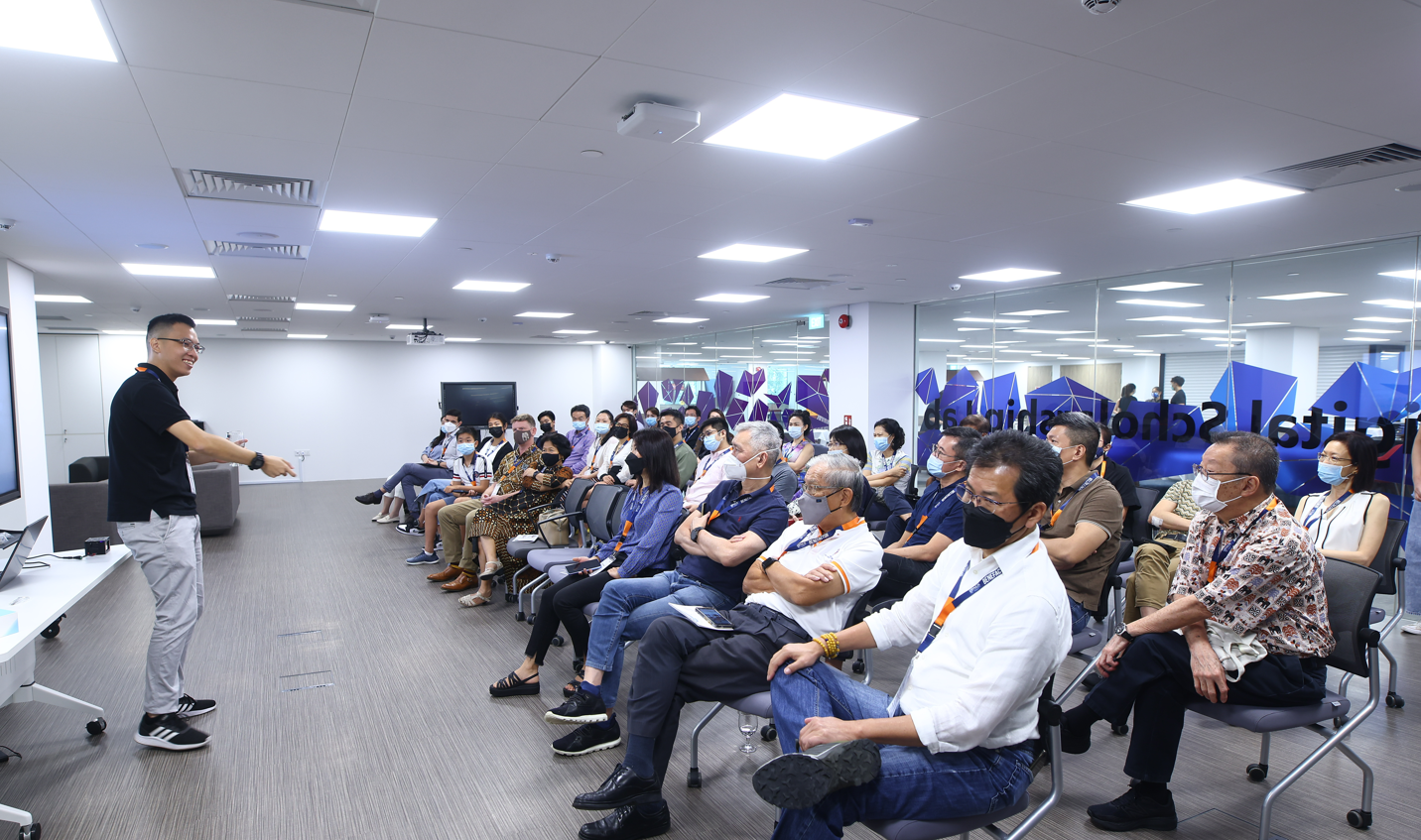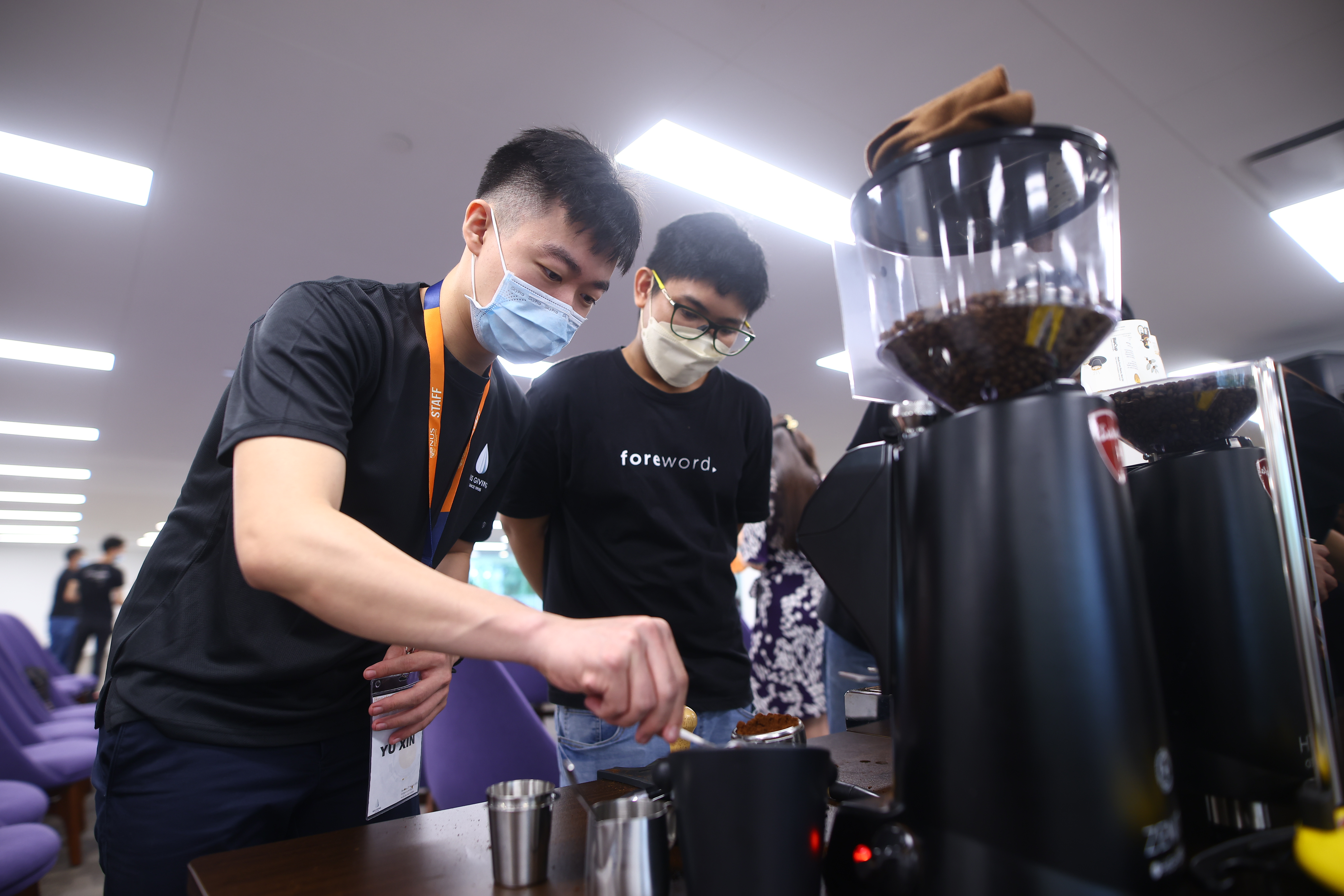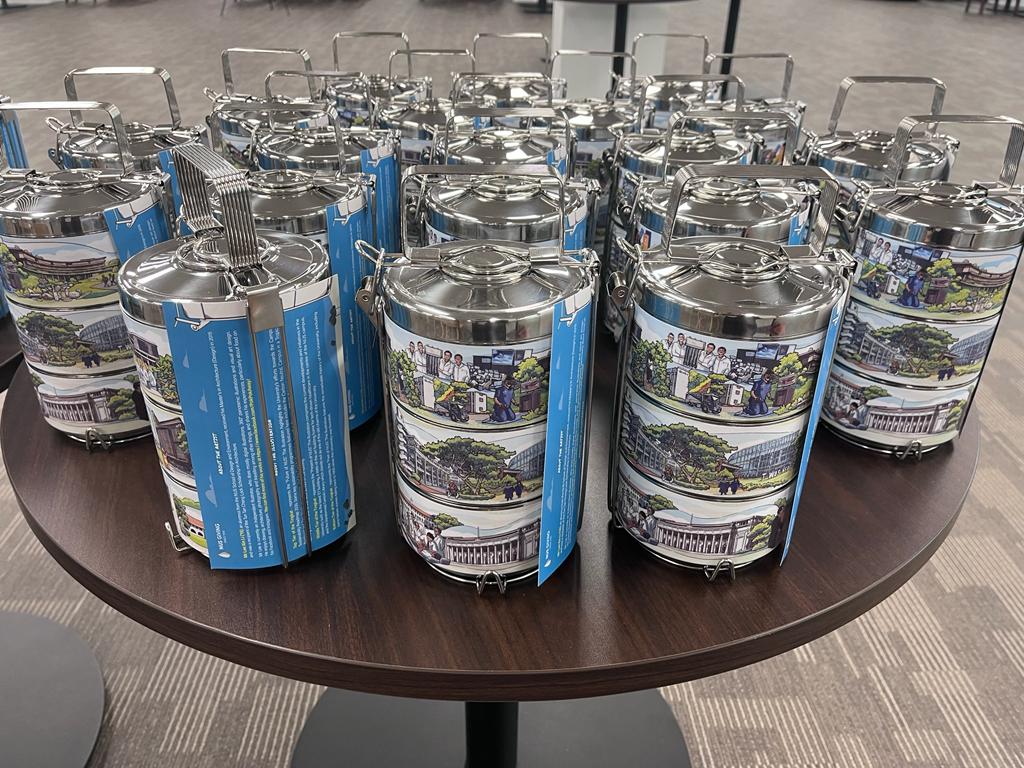Guests at the Benefactor Campus Experience enjoyed a day of learning, interactions and hands-on experiences.
 Mr Kit Yong, Founder of Forte Biotech, shared about bringing innovative lab solutions to prawn farmers for early disease detection.
Mr Kit Yong, Founder of Forte Biotech, shared about bringing innovative lab solutions to prawn farmers for early disease detection.
The Benefactor Campus Experience 2022, held on 27 August 2022, hosted delighted guests who gathered in person and enjoyed a day of learning, interactions and hands-on experiences. Running for the 7th year, the annual event is designed for our benefactors to have a deeper understanding of some of the great work accomplished at the University, and the positive impact created as a result, for our communities.
Guests gleaned valuable and exciting insights during the morning Masterclasses conducted by three Professors and four founders of startup companies, and had the opportunity to probe deeper at the Q&A sessions and even during lunch.
The afternoon’s cultural sessions allowed guests to enjoy at close view a Koto performance by the KotoKottoN NUS Ensemble. They also had the opportunity to personally experience playing the Japanese 13-string instrument, with guidance from instructors.
 Mr Tan Kah Tee is trying his hand at playing the Koto.
Mr Tan Kah Tee is trying his hand at playing the Koto.
Under the guidance of Mr Lim Wei Jie (’17) and his team of baristas from Foreword Coffee Roasters, a social enterprise, many guests had fun being baristas for the afternoon as
they perfected a cup of coffee, from measuring and grinding the beans to adding the final latte art with flourish.
Mr Lim Han Kiat (‘04) shared, “Many of us have these expresso machines at home, but never had such expert guidance to be able to make that perfect cup myself!”
 Social enterprise Foreword Coffee Roasters guided guests to make the perfect cuppa.
Social enterprise Foreword Coffee Roasters guided guests to make the perfect cuppa.
Many of the guests who are alumni and have missed the charms of the flagship NUS Central Library, participated in a guided tour through the newly renovated facilities which boast the TEL Imaginarium, 360imx, and the Digital Scholarship Lab, to explore the use of immersive and interactive technology in education and research. Guests also got to admire the new BookBridge and its impressive architecture.
 Mr Ouyang Xiuzhang pointing out a rare book collection that NUS Central Library has to his family.
Mr Ouyang Xiuzhang pointing out a rare book collection that NUS Central Library has to his family.
When the event concluded, guests could bring back a special souvenir – a tingkat wrapped in illustrations by Mr Lee Xin Li (’15), that represents the past, present and future of NUS.
 A special souvenir for guests who attended the Benefactor Campus Experience.
A special souvenir for guests who attended the Benefactor Campus Experience.
“Many thanks for a well-planned event and the choice of interesting topics presented. There was a good mix of interactive, hands-on sessions and informative ones. There was also sufficient time in between the sessions for some interaction among the audience. All in, it was a day well spent,” expressed Ms Nancy Tan (’79).
Development of a Gel Formulation to Decrease Pain and Inflammation in the Elderly
Associate Professor Giorgia Pastorin
Faculty of Science
Prof Pastorin and her team shared their research development on a gel that can be easily spread on the skin upon application. The gel releases a natural product that not only demonstrated decreased inflammation and pain sensation in an animal model of osteoarthritis, but also improved the recovery of the knee cartilage.
China and India: Can They Be Friends?
Professor Kanti Bajpai
Wilmar Professor of Asian Studies
Lee Kuan Yew School of Public Policy
In the summer of 2020, Chinese and Indian troops fought for the first time since 1975, with casualties on both sides. The China-India conflict goes back to 1962 when they fought a full-scale war. Prof Bajpai highlighted how the drivers of the China-India relationship are Perceptions, Perimeters, Partnerships and Power. For the relationship to improve, China has to deal with the issue of why it should concede to a weaker country. And for India, how can it reach a compromise with China. Can Asia’s two giants be friends rather than rivals given the four P’s?
Reflection of Computer Science Research
Professor Chua Tat Seng
Kwan Im Thong Hood Cho Temple Chair Professor
School of Computing
With the emergence and success of deep learning, Computer Science (CS) research has entered a new era of data-driven research paradigm. Prof Chua Tat Seng examined the history of CS, and in particular Artificial intelligence (AI) and discussed a new research paradigm that combines data-driven knowledge-oriented AI with a trustable and robust AI.
He shared an example of AI technology that could accurately predict which stocks will rise based on social media mentions and interactions the weekend before, and also discussed the application of AI to multimodal conversational search and recommendation, and finally, the research trends towards compelling and futuristic applications.
Graduate Research Innovation Programme (GRIP)
Founders of Start-Ups from NUS Enterprise
Three NUS GRIP start-ups, MediVR, reActo and Forte Biotech shared their entrepreneurship journey and experiences to a very interested audience, who had questions on the scalability of the innovations, and measurable benefits to society. After the presentations, some of the guests expressed interest in helping to fund or connect the startups with potential supporters.
NUS GRIP is a bespoke venture creation programme that provides step-by-step guidance that enables postgraduate students and researchers to transform research into deep technology start-ups. Through GRIP, aspiring entrepreneurs are empowered with all the
knowledge and skill sets necessary to create their own start-ups, industry linkages to real-world problems, mentorship, funding and other support necessary to take their start-ups off the ground.






